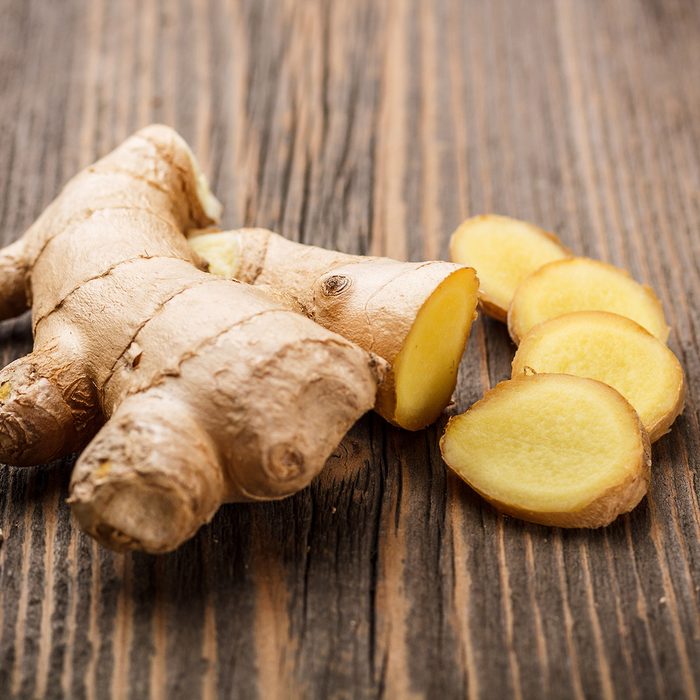
Ginger
A well-known remedy for an upset tummy, ginger is also one of the foods that reduce bloating. “It helps with digestion and provides relief from numerous GI distresses, including nausea and bloating,” says Deborah Orlick Levy, RD, a dietician and consultant for Carrington Farms Health and Nutrition. Her go-to foods include ginger candy, ginger tea, and adding fresh ginger to yogurt and stir-frys. Check out these causes of belly-bloating you need to know.
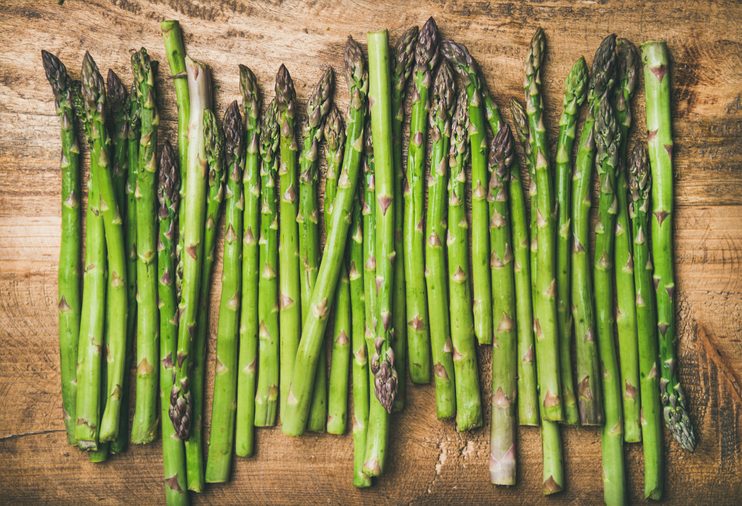
Asparagus
Flush out urine while simultaneously flushing out that bloated feeling. “Asparagus contains prebiotics, which like probiotics, help support good digestive bacteria,” says Levy. “That combination, along with flushing out water in the body, helps to relieve bloat.” Be cautious though. If you’re a person who has difficulty digesting asparagus, eating this vegetable may actually cause bloating. Find out these daily habits that reduce belly bloating.
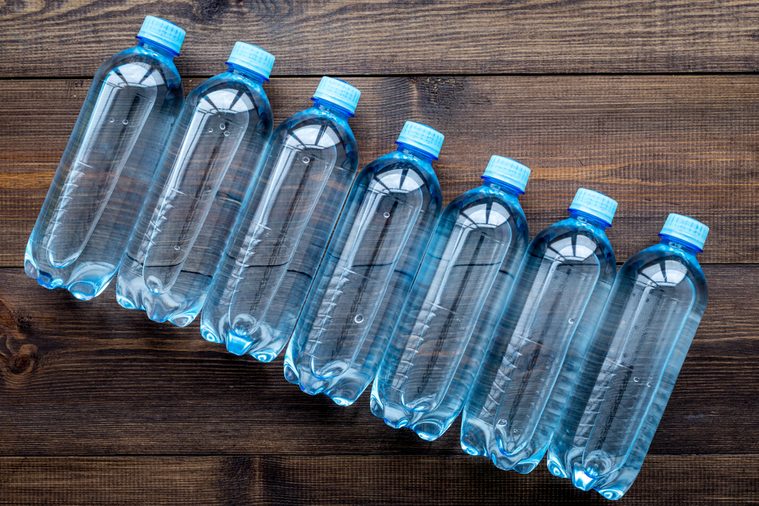
Water
You’re already bloated and you’re supposed to drink more water? Yep. However, steer away from carbonated drinks; they actually induce bloating and GI problems. “Plain water helps everything flush out of your system, “says Levy. If water is too bland for your taste buds, Levy suggests adding slices of cucumber, orange, or lemon to make it tastier.
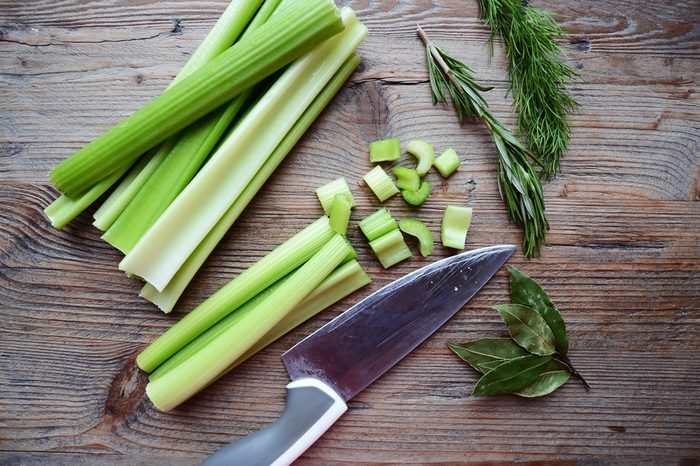
Celery
Crunching on celery may just feel like a workout for the jaws but it’s also one of the foods that reduce bloating. “Celery can be used as a digestive aid to control intestinal gas because its chemicals are known to decrease fluid retention,” says Jennifer Kartashevsky, RD, a nutrition educator at Mount Sinai Hospital, New York. Crunch on! Find out more natural remedies for belly bloating.
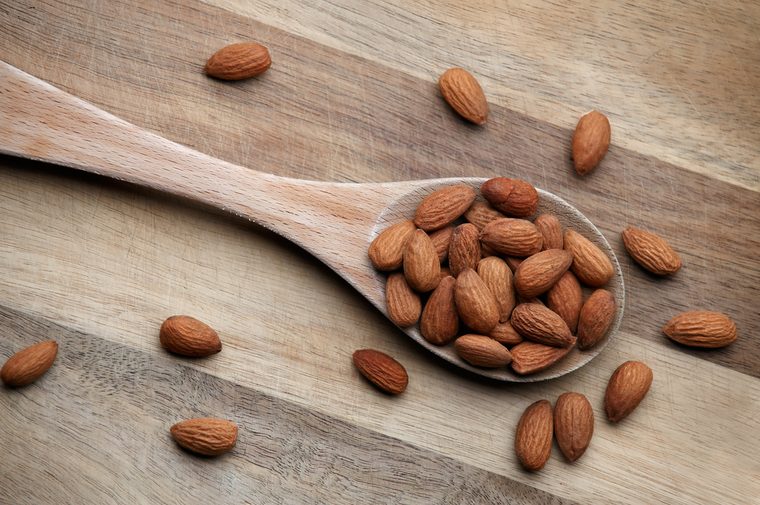
Almond milk
Some of us just can’t tolerate dairy and may be lactose intolerant. Plant-based versions of traditional dairy products can provide a non-bloating alternative according to Martica Heaner, PhD, adjunct associate professor of nutrition at Hunter College in New York. “The sugar or lactose in milk can cause belly bloat and pain,” says Heaner. “The dairy proteins can cause inflammation that may lead to mucus buildup and fluid retention,” she says.
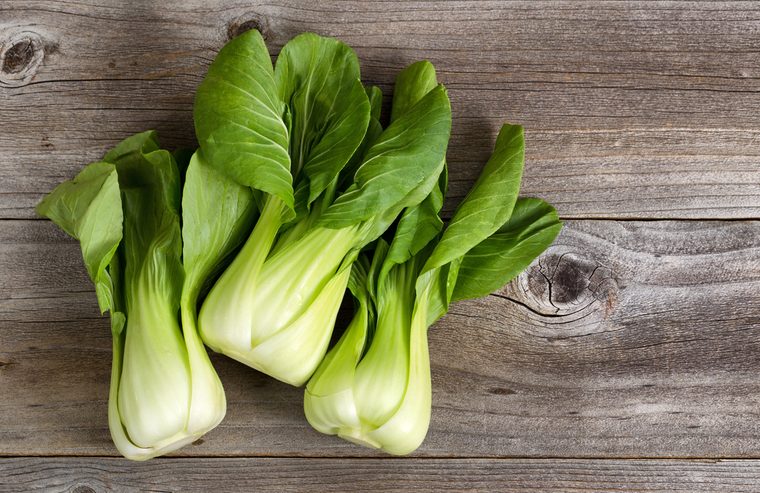
Bok choy
Leafy greens like bok choy help reduce bloating because they contain dietary nitrates that increase the expansion of your blood vessels, increasing circulation in the areas that need fluid removal, like a bloated tummy. In addition, leafy greens are high in the electrolytes magnesium and potassium. “Adding more magnesium and potassium from plant foods can help balance out the minerals, preventing the body from holding onto a disproportionate amount of sodium,” says Heaner. If you’re new to bok choy, cook or steam it first to avoid any further bloating. Find out the surprising foods that cause gas and bloating.
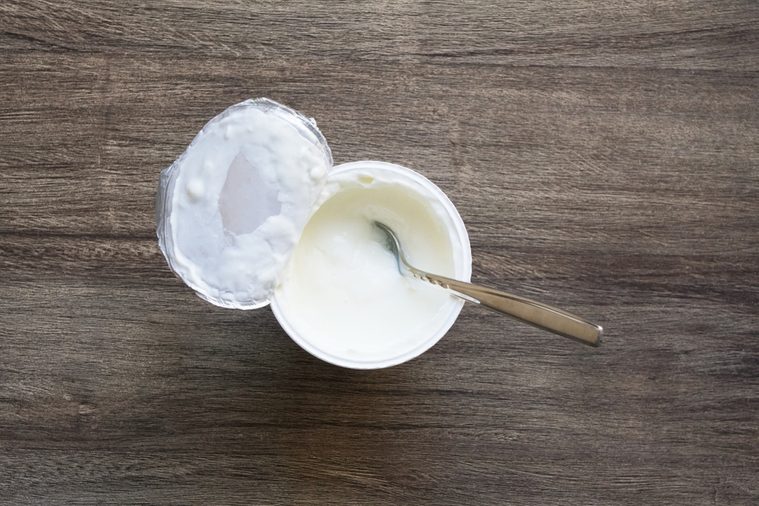
Kefir and yogurt
If dairy isn’t a problem for you, try kefir, a fermented milk beverage, and yogurt. Both contain probiotics, which are good for the belly, body and bloating according to Rene Ficek, RD, lead nutrition expert at Seattle Sutton’s Healthy Eating. “Kefir and yogurt promote good bacteria in the gut, which helps the digestive tract work more efficiently,” says Ficek. “As a result, you will be prone to less gas and bloating.” Learn about other foods – dairy and non-dairy – with healthy probiotics.
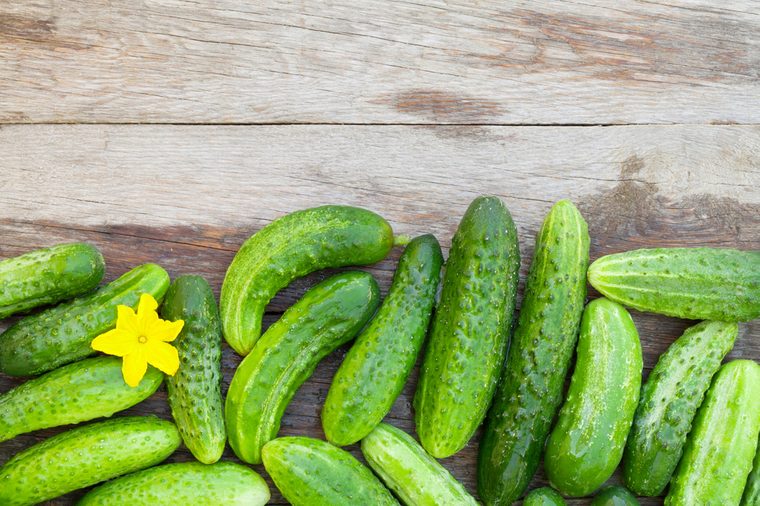
Cucumbers
Crunchy on the outside, and packed with 96 percent water on the inside, this salad topper is one of the foods that reduce bloating. “They are also full of fiber to help the digestive tract run smoother,” says Ficek. Don’t just save them for salads; add slices to your sandwich or wrap for a nice crunch.
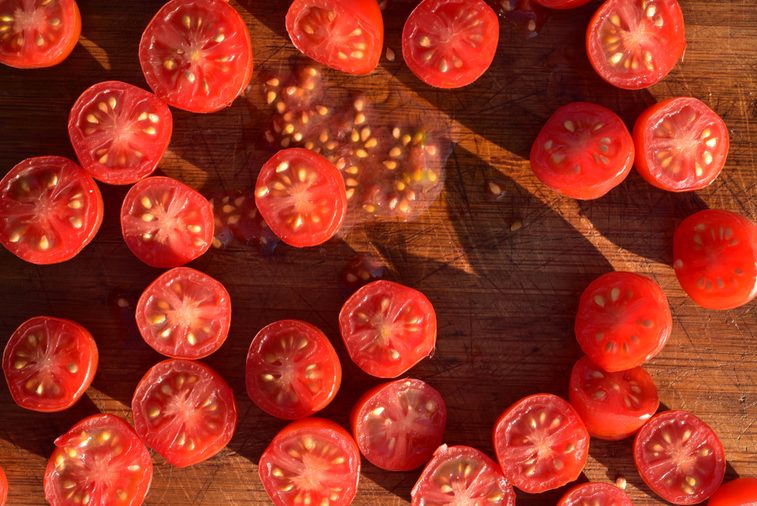
Tomatoes
You say tomato, I say tomahto. However, you pronounce it; tomatoes are great for reducing bloating. “Tomatoes are rich in potassium, which helps balance out sodium levels in the body, resulting in less water weight and bloat,” says Ficek. Learn more summer foods that cause bloating—and some that don’t.
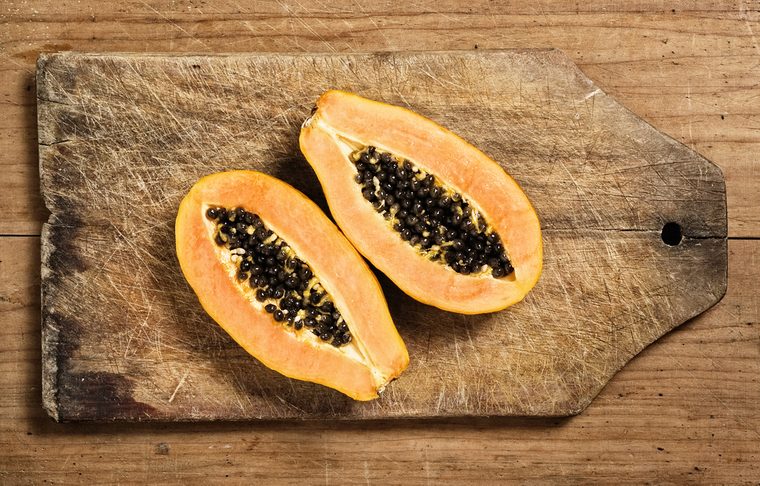
Papaya
Pretty to look at and tasty to eat yet some people are turned off by the odor of a ripe papaya. Don’t let the smell turn you away from its benefits for bloating. “In a small study a supplement containing papaya helped reduce gastrointestinal upset, including bloating,” says Adrienne Youdim, MD, director of the Center for Weight Loss and Nutrition at the Lasky Clinic in Beverly Hills, CA.
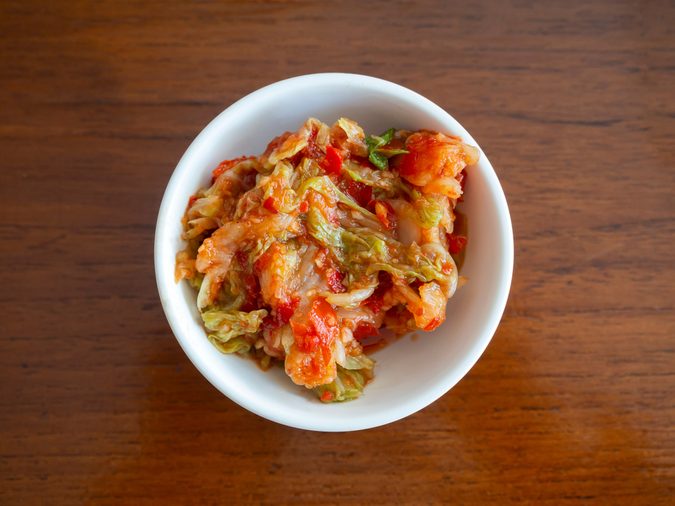
Kimchi
This fermented Korean side dish is rich in vitamins and aids in digestion. “It contains probiotics that support healthy intestinal flora and alleviates gut microbiota symptoms like bloating and gas,” says David Nico, PhD, of Drhealthnut.com and author of Diet Diagnosis. Not a fan of kimchi? Sauerkraut has the same benefits—or try one of these other foods that boost good bacteria in your gut.
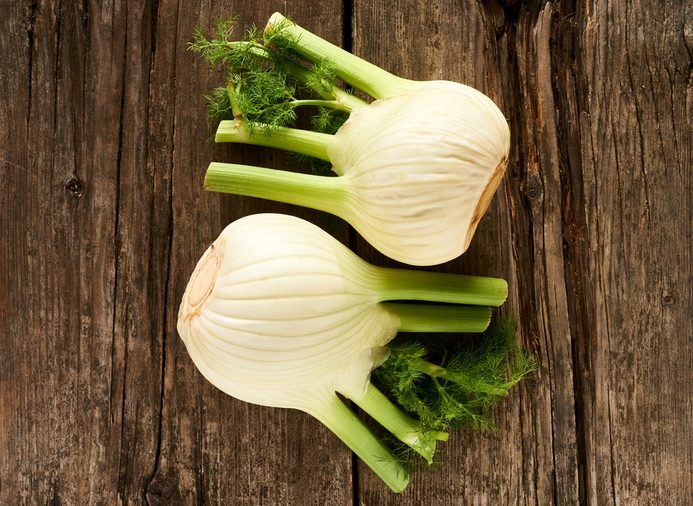
Fennel
This Mediterranean vegetable is known for its licorice-like taste and is one of the foods that reduce bloating you should try. Eat the seeds or brew a cup of fennel tea the next time your tummy is bloated. “Fennel is shown in studies to be an excellent source of reducing the effects of gas and bloating along with many other benefits,” says Dr. Nico. Find out other natural remedies for an upset stomach.
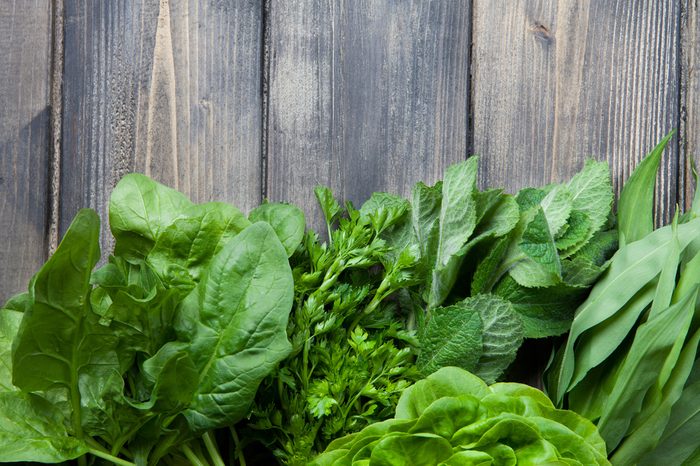
Peppermint
How about a cup of tea with dinner when you’re bloated? “Peppermint teas are excellent to start a meal and to improve digestion,” says Dr. Nico. Peppermint is a therapeutic herb used for many digestive conditions, including bloating. In some people, though, peppermint can aggravate heartburn. Next, find out the 12 things your stomach is trying to tell you.

